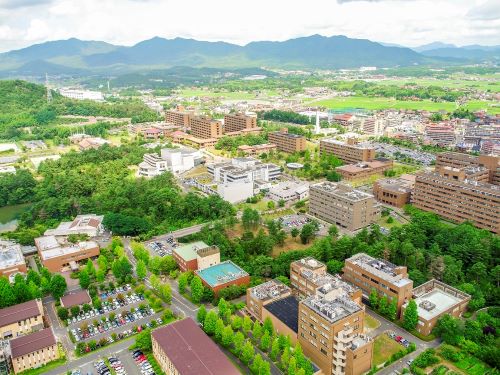E-mail:ura*office.hiroshima-u.ac.jp (Please replace * with @)
Researchers from around the world will study “knotted chiral meta matter” to understand the laws of nature and to develop new materials that help with sustainability.

A drone shot of Hiroshima University
A world-class institute for interdisciplinary science dedicated to a new research field called “knotted chiral meta matter” will open at Hiroshima University (HU), Japan in November 2022. The new "International Institute for Sustainability with Knotted Chiral Meta Matter (SKCM2) was selected to be funded through the World Premier International Research Center Program (WPI) from the Japanese Ministry of Education, Culture, Sports, Science and Technology (MEXT). The WPI, which began in 2007, supports the development of “globally visible” research centers in Japan that generate highly impactful research and recruit outstanding international researchers.
SKCM2 will be led by Dr. Ivan Smalyukh, Professor of Physics at the University of Colorado, Boulder and a world leader in material research who has received numerous scientific awards, including a presidential career award from the U.S. White House. The institute will allow for collaborations among researchers at HU and other Japanese and international institutions, including the University of Tokyo, Cambridge University (U.K.), the Massachusetts Institute of Technology (U.S.), and the Max Planck Institute for Theoretical Physics (Germany).
The international institute, SKCM2, interlinks an impressive list of researchers with expertise in a broad range of fields such as mathematics, physics, chemistry, biology, medicine, and engineering. Using a highly interdisciplinary approach, these researchers will deepen our understanding of the laws of nature by studying “knotted chiral meta matter,” which are artificial versions of the building blocks that make up everything. Although there is a multitude of scientific directions for this research, the center will focus on avenues that have direct applications for sustainability and human flourishing.
For example, Dr. Hiroshi Sato of RIKEN, Japan and Director Smalyukh will collaborate to use knotted chiral meta matter made from knotted organic molecules to create super-insulating materials to save energy used for heating and cooling buildings, which comprises approximately 40% of global energy use. SKCM2 research may also help solve problems in fields such as medicine or electronics. In addition to greatly expanding scientific knowledge and potential technological innovation to solve the world’s most pressing problems, the institute will be highly internationalized, including a progressive graduate training program with active international research exchanges. The program will also place an emphasis on recruiting and fostering women, who have been historically underrepresented in STEM fields.
The institute’s vision aligns directly with that of the host institution, HU, led by President Mitsuo Ochi. HU, a Japanese national university, is the leading research university in Western Japan and the first in the Chugoku and Shikoku region to be selected for the highly competitive WPI program. SKCM2 builds upon two centers in mathematical life sciences and advanced materials research first established at HU in 2012 and 2015, led by two other SKCM2 members, Professors of Chemistry, Drs. Shinichi Tate and Katsuya Inoue, respectively.
HU also has strong programs for early career researchers and the advancement of women in science, which have been managed by SKCM2’s Administrative Director, Dr. Manabu Abe, and Dr. Misako Aida. Aside from HU’s commitment to interdisciplinary research, HU is also highly internationalized and prioritizes peace and sustainability. This internationalization is in part due to having been selected for another MEXT program, the Top Global University Project, in 2014, which supports the development of Japan’s higher education system to train students to think and act globally. SKCM2 will help to further all these missions and will soon be actively recruiting students from Japan and abroad.
Hiroshima University Headquarters for Research in Collaborative Sciences Enabling the Future
Research Strategy and Promotion Division

 Home
Home














